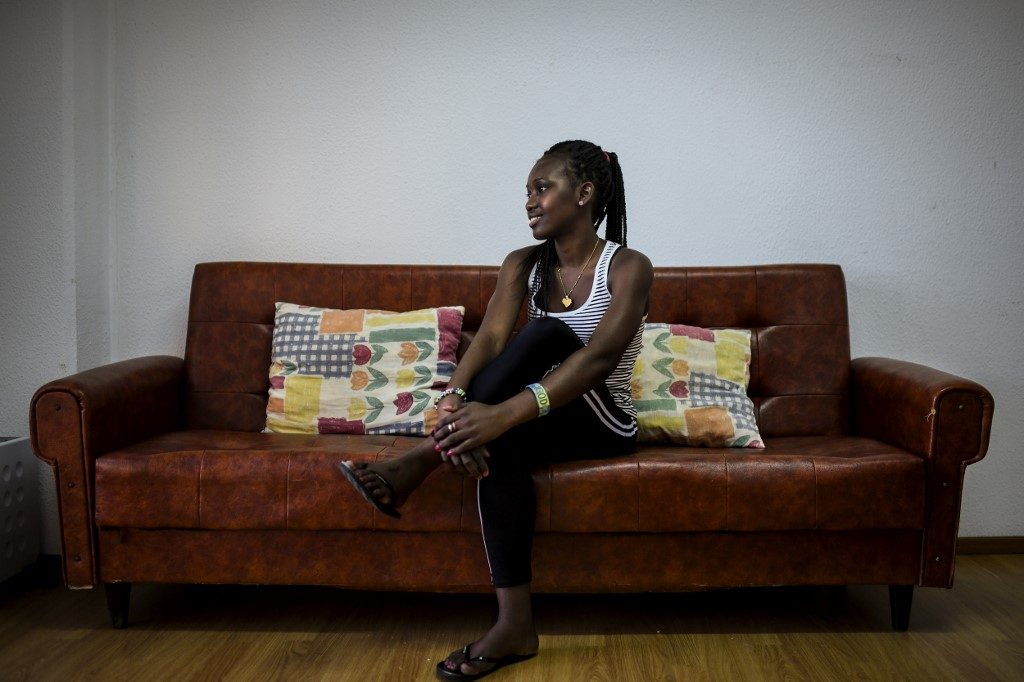SUMMARY
This is AI generated summarization, which may have errors. For context, always refer to the full article.

FUNDÃO, Portugal – A year after the rescue vessel Aquarius plucked Deborah Osaretin from the Mediterranean’s churning waters, she is building a new life as a refugee in Fundao, central Portugal.
The cheerful 21-year-old, who fled Nigeria in the face of continual attacks by the Islamic extremist group Boko Haram, prepares couscous in a modest apartment, paid for by city funds.
Portugal is an exception in Europe in that it faces a labor shortage and encourages immigration.
Osaretin has found work in a firm making watch parts in Fundao, a town of 28,000 inhabitants, some 250 kilometers (155 miles) northeast of Lisbon.
Her flatmate Augustina Sunday, also 21, works in a cherry orchard.
In June last year, the Aquarius was one of the first rescue vessels that the Italian government blocked as it closed the country’s doors to NGOs picking up migrants from the Mediterranean.
After a week at sea, the boat docked in Spain and its 630 passengers were distributed across 6 countries, with Portugal taking in 19 – all of whom wound up in Fundao.
‘Pride at receiving refugees’
Fundao converted a former Catholic seminary into a refugee reception center in 2017, offering itself as a model destination for integration, while also moving to reverse the rural exodus.
The building at the foot of the Gardunha mountains is just minutes away from the small village of Donas, where the family of UN Secretary General Antonio Guterres, the former UN High Commissioner for Refugees, comes from.
The center shelters some 30 refugees including those from the Aquarius, mostly from Nigeria, Senegal, Eritrea and Sudan.
“The migrants… help develop our businesses and create value,” says Fundao Mayor Paulo Fernandes.
“We have moved beyond the first phase of mistrust to pride at receiving refugees.”
Rosa Monteiro, secretary of state with responsibility for refugee affairs, says Portugal’s “positive attitude towards migrants” stems from its own history of migration, most recently because of the 2008-09 financial crisis.
“The Portuguese have this facility to feel empathy with the new arrivals,” Monteiro tells AFP.
Strive to keep them
Since 2015, almost 2,000 people, including children and the elderly, have arrived in Portugal as part of an EU refugee distribution program.
Monteiro said that 43% of those of working age had found jobs in agriculture, restaurants, the clothing industry or construction.
The others are still in training and resettlement programs, or have left the country.
The government believes that nearly half of the refugees that Portugal has taken in have left the country, sometimes after only several weeks.
“The refugees we are losing often want to rejoin family members in other countries,” says Monteiro.
“They may also leave for countries with a better economic outlook. To avoid that, we try to inform them about Portugal as much as possible.”
‘Seven children’
Osaretin is enrolled in an 18-month European program designed to foster the integration of new arrivals.
In 6 months she must give up the apartment and fend for herself without public assistance.
“To tell the truth, I am very happy as now I have a roof over my head, I am working, I eat well,” she tells AFP.
“My goal is to make my life here, find a husband and have 7 kids,” she grins.
Osaretin’s journey took her across deserts in Niger and Libya before she arrived on the Mediterranean coast, where she boarded a barely seaworthy vessel before being rescued by the Aquarius.
“Every day I think of the risks I took, when I had no strength left, no water… I wouldn’t advise anyone to do what I did,” she says.
‘Just want to be free’
Another Fundao resident, 20-year-old Mory Camara, left Guinea in 2017 where he says he was persecuted for his Christian faith in his mainly Muslim village.
He made it to Libya, then tried to cross the Mediterranean and almost drowned when his vessel sank.
Having reached Portugal in March he intends to stay put, he says.
“Here, I am safe and free to go about my business. Those who risk getting to Europe like I did just want to be free,” he says.
Camara, who would like to work in information technology, is taking language classes while looking for a job opening.
Andreia Roque, a Fundao official, praised the migrants’ determination to succeed.
“Despite the language question, which is the most difficult, they are very motivated,” she says.
“That’s why we hope in the short term to have more communal space and extend our capacity to take people in.” – Rappler.com
Add a comment
How does this make you feel?
There are no comments yet. Add your comment to start the conversation.